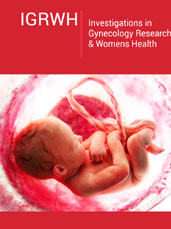- Submissions

Abstract
Investigations in Gynecology Research & Womens Health
The Impact of Infertility on Quality of Life and Psychological Well-Being: A Comprehensive Prospective Cohort Study
-
Open or CloseAsim F Alwohaibi1, Sarah A Maghrabi1, Sondos T Alhawamdeh1, Joud M AlOtaibi1, Razan S Alotaibi1 and Waleed H Alkhamis1,2*
1Department of Obstetrics and Gynecology, Gynecologic Reproductive Endocrinology & Infertility Unit, College of Medicine, King Saud University, Saudi Arabia
2Women’s and Children’s Health, St George Hospital and community services, Australia
*Corresponding author:Waleed H Alkhamis, Department of obstetrics and gynecology, Gynecologic Reproductive Endocrinology & Infertility Unit, College of medicine, King Saud University, Saudi Arabia
Submission:April 17, 2025;Published: April 28, 2025
Abstract
Background: Infertility, defined as the inability to conceive after one year of unprotected intercourse, affects approximately 15% of couples worldwide. This condition often brings significant emotional and psychological challenges, leading to diminished quality of life and well-being. Despite its prevalence, the psychosocial impact of infertility remains underexplored, necessitating comprehensive research to inform effective support and intervention strategies.
Objectives: This study aims to assess the quality of life and psychological well-being among individuals experiencing infertility. The specific objectives are to evaluate the impact of infertility on these parameters, identify socio-demographic factors influencing quality of life and psychological well-being, and determine the coping mechanisms and support systems utilized by individuals with infertility.
Methods: A prospective cohort study was conducted with 209 individuals experiencing infertility, recruited from a reproductive health clinic. Data were collected at baseline, six months, and twelve months using standardized instruments: the WHOQOL-BREF for quality of life, the DASS-21 for psychological well-being, and the Fertility Problem Inventory (FPI) for infertility-related stress. Demographic and health/fertility data were also gathered. Statistical analyses, including correlation and regression analyses, were performed using SPSS software to identify significant predictors and trends.
Result: The study revealed a significant negative impact of infertility on both quality of life (β = -0.36, 95% CI: -0.47 to -0.25, p < 0.001) and psychological well-being (β = -0.29, 95% CI: -0.40 to -0.18, p < 0.001). Longer duration of infertility (r = -0.28, p < 0.01), lower income (r = -0.24, p < 0.01), lack of social support (r = -0.31, p < 0.01), and higher levels of stress (r = 0.35, p < 0.01) were strongly correlated with poorer outcomes. Regression Analysis identified treatment and medical services satisfaction (β = 0.38, 95% CI: 0.25 to 0.51, p < 0.001), duration of marriage (β = -0.13, 95% CI: -0.24 to -0.02, p = 0.009), and previous pregnancy outcomes (β = 0.20, 95% CI: 0.08 to 0.32, p = 0.002) as significant predictors of quality of life. Psychological well-being was significantly influenced by age (β = -0.04, 95% CI: -0.07 to -0.01, p = 0.045), duration of marriage (β = 0.16, 95% CI: 0.04 to 0.28, p = 0.007), previous abortions (β = -0.08, 95% CI: -0.14 to -0.02, p = 0.014), and previous pregnancies (β = 0.16, 95% CI: 0.02 to 0.30, p = 0.024). The findings highlight the importance of addressing both medical and psychosocial aspects in infertility care.
Conclusion: Infertility significantly diminishes quality of life and psychological well-being, underscoring the need for comprehensive and patient-centered care. Effective interventions should integrate medical treatment with psychological support and social services tailored to the specific needs of individuals and couples facing infertility. By adopting a holistic approach, healthcare providers can better support the emotional and psychological well-being of this population, ultimately improving their overall quality of life. These insights provide a valuable foundation for developing targeted strategies to mitigate the psychosocial burden of infertility and enhance the effectiveness of reproductive health services.
Keywords:Infertility; Quality of life; Psychological well-being; Prospective cohort study; Infertility-related stress; WHOQOL-BREF; DASS-21; Fertility Problem Inventory (FPI); Longitudinal analysis; Patient-centered care; Emotional support; Reproductive health; Psychosocial impact; Demographic factors; Coping mechanisms; Social support systems
 a Creative Commons Attribution 4.0 International License. Based on a work at www.crimsonpublishers.com.
Best viewed in
a Creative Commons Attribution 4.0 International License. Based on a work at www.crimsonpublishers.com.
Best viewed in 








.jpg)






























 Editorial Board Registrations
Editorial Board Registrations Submit your Article
Submit your Article Refer a Friend
Refer a Friend Advertise With Us
Advertise With Us
.jpg)






.jpg)














.bmp)
.jpg)
.png)
.jpg)










.jpg)






.png)

.png)



.png)






